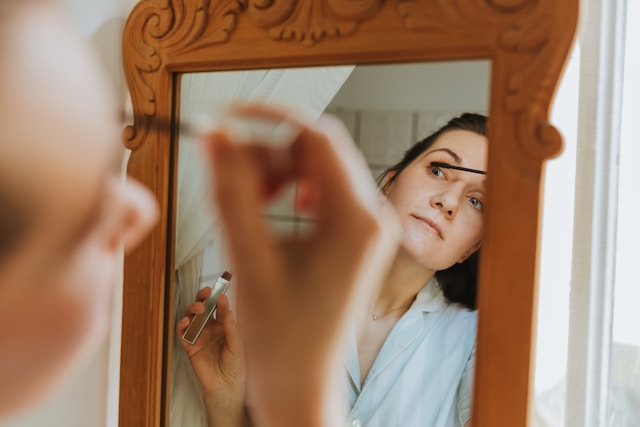Confidence is seen as a good thing, but achieving it can be a bit tricky.

Many people chase after things they think will boost their self-love, only to find themselves still feeling insecure. Here are some things you might be doing to make you feel good about yourself that are probably a major waste of time.
1. Having a perfect body
 Source: Unsplash
Source: Unsplash Chasing physical perfection won’t automatically boost your confidence. While being healthy is important, true confidence comes from within. Obsessing over your appearance can actually make you more self-conscious and less confident in the long run. Focus on self-acceptance rather than an unrealistic ideal.
2. Wearing designer clothes

Splurging on expensive outfits might give you a temporary confidence boost, but it’s not sustainable. Real confidence isn’t about what you wear, but how you carry yourself. Relying on labels to feel good about yourself can lead to a never-ending cycle of consumption without addressing the root of your insecurities.
3. Getting more social media followers
 Source: Unsplash
Source: Unsplash A high follower count might seem like validation, but it’s often an empty metric. True confidence doesn’t come from likes or comments. Constantly seeking approval online can actually make you more insecure and dependent on anyone else’s opinions. Real-life connections and accomplishments are far more meaningful for building genuine self-assurance.
4. Always being right

Needing to be right all the time isn’t confidence — it’s insecurity in disguise. Truly confident people are comfortable admitting when they’re wrong or don’t know something. Being open to learning and growing shows much more self-assurance than stubbornly clinging to your own opinions.
5. Having a lot of money

While financial stability can reduce stress, having a fat bank account doesn’t automatically make you confident. Many wealthy people still struggle with self-doubt. True confidence comes from your sense of self-worth, not your net worth. Focus on personal growth and achievements rather than accumulating wealth.
6. Being in a relationship

Thinking a romantic partner will solve your confidence issues is a recipe for disappointment. Healthy relationships can support your self-esteem, but they can’t create it for you. Confidence needs to come from within. Relying on someone else for your self-worth can lead to codependency and more insecurity.
7. Getting a promotion

While career success can be satisfying, it doesn’t guarantee confidence. Many high-achieving professionals still battle imposter syndrome. True confidence comes from knowing your worth beyond your job title. Focus on developing skills and embracing challenges rather than just climbing the corporate ladder.
8. Having a busy social calendar

Being constantly surrounded by people doesn’t necessarily make you more confident. Quality relationships matter more than quantity. Filling your schedule to avoid being alone can actually be a sign of insecurity. Confident people are comfortable with solitude and don’t need constant social validation.
9. Winning arguments

Dominating debates might feel good in the moment, but it doesn’t build lasting confidence. True self-assurance comes from being able to listen, consider other viewpoints, and communicate respectfully. Constantly trying to prove you’re right often stems from a place of insecurity, not confidence.
10. Getting plastic surgery
 Source: Unsplash
Source: Unsplash While cosmetic procedures might address specific insecurities, they don’t automatically boost overall confidence. True self-assurance comes from accepting yourself, imperfections and all. Chasing an ideal appearance through surgery can sometimes lead to a never-ending cycle of dissatisfaction and more procedures.
11. Having the latest gadgets
 Source: Unsplash
Source: Unsplash Owning cutting-edge technology might make you feel cool, but it doesn’t create genuine confidence. True self-assurance isn’t about what you own, but who you are. Constantly upgrading your devices to keep up with trends often stems from a need for external validation rather than inner confidence.
12. Being sarcastic or cynical

Using sarcasm as a shield doesn’t make you confident — it often masks insecurity. True confidence allows for vulnerability and sincerity. Constantly being cynical or dismissive can push people away and prevent genuine connections, which are crucial for building real self-assurance.
13. Drinking alcohol
 Source: Unsplash
Source: Unsplash While alcohol might lower inhibitions temporarily, it doesn’t create lasting confidence. Relying on liquid courage can actually undermine your self-assurance in the long run. True confidence comes from facing your fears and challenges sober, and learning to trust in your own abilities.
14. Putting people down

Belittling people might make you feel superior momentarily, but it’s not real confidence. Truly self-assured people don’t need to make other people feel smaller to feel good about themselves. Building people up and being genuinely excited about their success actually shows much more genuine confidence.
15. Pretending to be someone you’re not

Faking a persona you think is more confident or likeable won’t lead to genuine self-assurance. True confidence comes from embracing who you really are, quirks and all. Pretending to be someone else is exhausting and ultimately undermines your authentic self-confidence.




